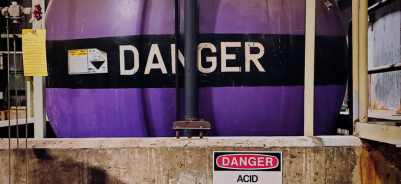Surface Treatment
Pumps for Surface Treatment Applications
Surface treatment processes are essential across a range of industrial sectors for preparing, cleaning, modifying, and finishing metal surfaces. The process involves applying different chemical compounds and sequences to alter the metal’s surface at a molecular level. These aggressive and often hazardous chemical and caustic solutions gives the surface required properties such as corrosion resistance, adhesion or electrical conductivity.
Surface treatment is widely used in industries such as aerospace, automotive, construction, electronics, and manufacturing. After use the spent product must be safely recycled or disposed of in accordance with environmental regulations.
In these environments, pumps are used to transfer the hazardous fluids in order to maintain a safe working environment and to ensure accurate application of the chemicals required.
 Chemicals Commonly Used in Surface Treatment
Chemicals Commonly Used in Surface Treatment
A broad range of chemicals are employed during the various stages of the surface treatment cycle. These include:
Alcohols which are used for degreasing and cleaning surfaces
Antizonants used in rubber and polymer treatment to prevent ozone degradation
Chlorine for disinfecting and oxidation processes
Deionised Water which is used as a rinsing agent free from minerals
Dyes for identification or functional coating during anodising
Electrolyte Solutions used in electroplating and electrochemical finishing
Enzymatic Solutions used in environmentally friendly surface cleaning
Petroleum-based Liquids which are used for coating or cleaning purposes
Phosphoric Acid which is used for etching and rust removal
Solvents used in degreasing and stripping processes
Sulphuric Acid which is common in anodising and pH adjustment
Key Pump Features for Surface Treatment
Selecting the right pump for surface treatment operations is critical, not only for process efficiency but also for operator safety and environmental protection. At North Ridge Pumps, we take care to specify the correct pump configuration tailored to your chemical handling needs, ensuring both performance and compliance.
1. Smooth Discharge Flow
To avoid splashing or foaming, particularly when dealing with caustic or volatile fluids, we recommend pump designs that enables a smooth, low-pressure discharge. This protects operators and ensures process consistency, especially in rinse tanks and chemical dosing systems.
2. Seal-less Pump Technology
Due to the hazardous nature of many surface treatment chemicals, we recommend seal-less magnetic drive pumps or peristaltic or diaphragm pumps be used. By removing mechanical seals (a common point of failure which will cause leaks), these pumps greatly reduce maintenance, improve safety, and contain corrosive or toxic chemicals securely.
3. ATEX Compliance
Many surface treatment areas fall under ATEX-rated zones due to the presence of flammable vapours. We offer ATEX-certified pumps to ensure safe operation in these environments, helping you meet regulatory standards without compromising performance.
4. Solid Handling Capability
Surface treatment fluids may contain suspended solids, metal particles, or sludge as particles, paint or debris are removed from surfaces. Our pumps can be specified with features such as enlarged clearances or wear-resistant internal components or design to accommodate particulates, ensuring long pump life and uninterrupted service when pumping solids.
Types of Pumps Used in Surface Treatment
We supply and manufacture a variety of pump types tailored to different chemical and operational requirements in surface treatment:
1. Centrifugal Pumps
Magnetic Drive Centrifugal Pumps are ideal for handling aggressive chemicals without the risk of leakage due to their seal-less design.
Best for: Acids, solvents, electrolytes
Advantages: Leak-free, corrosion-resistant, low maintenance
Limitations: Not ideal for fluids with solids or high viscosities. For fluids with solids an open impeller standard centrifugal pump may be required or a double mechanical seal with seal flush
2. Air Operated Double Diaphragm (AODD) Pumps
AODD pumps are highly versatile and capable of dry running. They can handle viscous and corrosive fluids with solids.
Best for: Slurries, acids, alkaline cleaners
Advantages: Self-priming, portable, safe for explosive areas
Limitations: Requires compressed air, pulsation dampening may be needed. Should the diaphragms breach the chemical can vent via the exhaust causing an aerosol affect and should ideally be piped to a drain or considered during system design.
3. Peristaltic Pumps
Peristaltic Pumps offer gentle, accurate chemical dosing and are ideal for abrasive or shear-sensitive fluids.
Best for: Sludges, chemical dosing, wastewater from surface treatment
Advantages: No seals or valves, easy maintenance
Limitations: Hose wear over time, lower flow rates
4. Vertical Immersion Pumps
Vertical Immersion pumps are Installed directly in chemical tanks and are suitable for both continuous circulation or batch transfer.
Best for: Rinse tanks, large chemical baths
Advantages: No mechanical seal, space-saving design
Limitations: Requires tank mounting, limited to vertical installations. Not effective at sludge handling and must be kept above sludge in base of tank.
5. Vane Pumps
Rotary vane pumps use sliding vanes to move fluid and are suitable for handling thin, low-viscosity solutions.
Best for: Solvents, alcohols, deionised water
Advantages: Smooth flow, self-priming, compact design
Limitations: Not ideal for abrasive or highly viscous fluids; wear can occur with poor lubrication
6. Barrel Pumps
Barrel Pumps are designed to safely extract chemicals from drums, barrels, or IBCs, especially where decanting hazardous liquids is required.
Best for: Transferring acids, alkalis, solvents from containers and intermittent use.
Advantages: Portable, easy to clean, minimizes chemical exposure
Limitations: Limited flow rate, often not suited for continuous or high-volume transfer
Why Choose North Ridge Pumps?
With over 20 years of experience supplying pumps to industrial sectors worldwide, we understand the demands of surface treatment applications. Whether you are working with highly corrosive fluids, require ATEX compliance, or need accurate chemical dosing, we can specify the ideal solution based on your process and fluid properties.
We supply pumps in a wide variety of chemically resistant materials such as PVDF, PTFE, stainless steel, ensuring compatibility with even the most challenging substances.
Get in touch with our technical team to discuss your surface treatment requirements. We will help you select a pump that ensures efficiency, safety, and long-term reliability in your process.
View our range of pumps for Surface Treatment and plating applications




